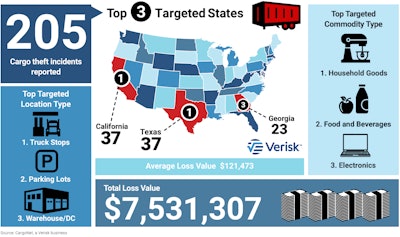Trucking news and briefs for Friday, Dec. 22, 2023:
Alleged Clean Air Act violations: Cummins agrees to pay $1.675B
Cummins Inc. has reached an agreement with the federal government and California to settle claims regarding its emissions certification and compliance process for certain engines primarily used in pickup truck applications.
According to the Department of Justice, Cummins has agreed to pay a $1.675 billion penalty to settle claims that it violated the Clean Air Act by installing "emissions defeat" devices on hundreds of thousands of engines.
Cummins said it “has cooperated fully with the relevant regulators, already addressed many of the issues involved, and looks forward to obtaining certainty as it concludes this lengthy matter.”
Cummins also said that it conducted an extensive internal review and worked collaboratively with the regulators for more than four years, adding that it “has seen no evidence that anyone acted in bad faith and does not admit wrongdoing.”
DOJ said Cummins allegedly installed defeat devices on 630,000 model year 2013 to 2019 RAM 2500 and 3500 pickup truck engines. The company also allegedly installed undisclosed auxiliary emission control devices on 330,000 model year 2019 to 2023 RAM 2500 and 3500 pickup truck engines.

Cummins noted that it has already recalled model year 2019 RAM 2500 and 3500 trucks and has initiated a recall of model years 2013 through 2018 RAM 2500 and 3500 trucks, and previously accrued a total of $59 million for the estimated costs for executing these and other related recalls.
[Related: EPA settles CARB violations with two fleets]
Cummins expects to record a charge of approximately $2.04 billion in the fourth quarter of 2023 to resolve these and other related matters involving approximately one million pickup truck applications in the United States. Of this amount, approximately $1.93 billion relates to payments that are expected to be made in the first half of 2024.
Attorney General Merrick B. Garland said the $1.675 billion penalty is “the largest civil penalty we have ever secured under the Clean Air Act, and the second largest environmental penalty ever secured.
“The types of devices we allege that Cummins installed in its engines to cheat federal environmental laws have a significant and harmful impact on people’s health and safety,” Garland added. “For example, in this case, our preliminary estimates suggest that defeat devices on some Cummins engines have caused them to produce thousands of tons of excess emissions of nitrogen oxides. The cascading effect of those pollutants can, over long-term exposure, lead to breathing issues like asthma and respiratory infections.”
Garland concluded that such a penalty “should make clear that the Justice Department will be aggressive in its efforts to hold accountable those who seek to profit at the expense of people’s health and safety.”
The settlements are subject to final regulatory and judicial approvals.
[Related: Rhode Island fleet owner sentenced for illegal emissions 'tunes']
Protect your cargo over long winter holiday
 California and Texas tied for the most cargo theft incidents reported during the last five winter holiday periods.CargoNet
California and Texas tied for the most cargo theft incidents reported during the last five winter holiday periods.CargoNet
As is typical with most extended holiday periods, cargo theft activity is expected to increase during the holiday period between Dec. 23 and Jan. 2.
Cargo theft recording firm CargoNet reported this week that supply chain theft activity remains extremely high, adding it believes it will continue into the holiday season as experienced cargo thieves will seek to exploit a target-rich environment of unattended trucks and closed warehouses.
CargoNet has reviewed theft data from a 10-day analysis period spanning Dec. 23 to Jan. 2 for the past five years to help supply chain professionals secure their supply chains for the upcoming holiday. In this analysis, there were 205 incidents reported to CargoNet, and the average cargo theft was valued at $121,473. The number of incidents increased progressively each year. Last holiday season, there were 56 incidents reported during this period.
Like previous years, incidents were most common in Texas and California, tied at 18% of total incidents in each state. Incidents in other major cargo theft hotspots remain common. Incidents in Florida tripled from 2021 to 2022. Pennsylvania also saw an increase from none reported in 2021 to five reported incidents in 2022. In Georgia, Illinois, and Tennessee, cargo theft incidents remained consistent year-over-year.
[Related: Alarming cargo theft rise -- 59% higher than last year -- with freight misdirection schemes]
Household commodities such as appliances, furniture and cleaning supplies are the commodities most targeted by cargo thieves. Electronics like televisions and computers were the second most targeted commodity type, but CargoNet noted that commodity preferences closely mimic consumer demand.
Thieves most often stole unattended vehicles and shipments parked at major retail parking lots and truck stops. However, fictitious pickups, often involving identity fraud or other subterfuge, have become a favored form of theft over the last year, and CargoNet expects fictitious pickups will be a favored form of theft over the holiday period. The firm also noted that incidents at warehouse/distribution centers were a close third to these two categories. This is a common theft location for fictitious pickup incidents.
Noteworthy thefts from previous winter holidays include:
- $507,105 theft of tequila from Tampa, Florida
- $500,000 theft of footwear from Douglasville, Georgia
- $440,000 theft of apparel and home products from Union City, California
- $400,000 theft of mattresses from Columbia, Maryland
- $318,759 theft of laptops from Livermore, California
CargoNet offers the following tips for protecting cargo over the holiday period, in what's been a year with cargo theft at an extremely high level:
 CargoNet
CargoNet
Arkansas DOT calls for ‘Truck Holiday’ during April’s solar eclipse
 At least a portion of 13 states are expected to experience a total solar eclipse on April 8, 2024.Kenneth Stubbs
At least a portion of 13 states are expected to experience a total solar eclipse on April 8, 2024.Kenneth Stubbs
The Arkansas Department of Transportation is suggesting truckers take a day off April 8 of next year as a total solar eclipse passes over the state.
The department expects so many eclipse viewers will flock to the state that they will flood the highways, making the day "mostly unproductive for freight vehicles." ArDOT also said it may limit the issuance of oversized permits on the days leading up to and immediately after the eclipse.
Those are just two of the suggestions included in ArDOT's traffic management plan for the eclipse, which the department said could be the largest tourism event in the state's history. It suggests as many as 1.5 million visitors could come to Arkansas to view the eclipse, which is expected to last just 15 minutes as the moon passes between Earth and the Sun. ArDOT also says 500,000 Arkansans will travel from their homes to be within the 117-mile-wide path of the eclipse.
Arkansas is but one of a number of states in the path of totality for the eclipse. According to NASA, other states in the path of totality include parts of Texas, Oklahoma, Missouri, Illinois, Kentucky, Indiana, Ohio, Pennsylvania, New York, Vermont, New Hampshire and Maine.
ArDOT's Traffic Management Plan is meant to advise public officials as they prepare for and manage the expected increase in traffic before, during and after the eclipse, which will create total darkness for about four minutes.
[Related: DOTs warn truckers about driving during eclipse, implement truck restrictions]









